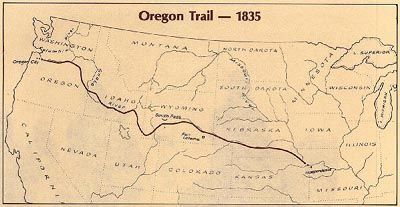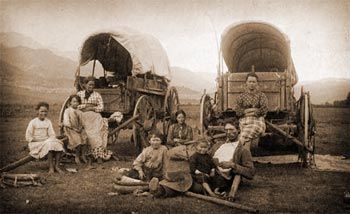|
A WebQuest on The Oregon Trail Designed by Len
Updike Introduction | Task | Process | Evaluation | Conclusion | Credits | Teacher Page Free land! Imagine the opportunities you could have if your government were to give you free land for you and your family to claim and settle. Wherever you live....whatever you do for a living.....this is your chance to start over and make a new life in an unknown area. All you have to do is pack your things and travel west. You may claim any tract of land you desire. Sounds easy enough, right? In the 1840's, this was the scenario offered to those willing to accept. Most people during that era lived in the eastern half of the country. In order to expand the country's territory westward and provide hope and prosperity to its citizens, the government offered free land claims to all who took the challenge of an unknown quest, through unknown territory with only the supplies and possessions you could carry with you. The purpose of this
WebQuest is not only to provide the history of how the west was
pioneered, but for you to think how it must have felt to experience
such an adventure. Would you be excited? Sad? Scared? What do you
bring? What do you leave? How do you know how to get there if you
don't know exactly where it is you are going? These are just some
of the questions of those who pioneered the journey west. You will be guided to many sources of information. Your task is to research the information provided for a virtual exploration west. You will be working with a partner to find out what you should know to be as prepared as possible for the journey west.....to your new home. You might want to consider how far away it is to your destination and how long do you think it would take to get there? (Remember, there were no cars in the 1840's!) These may help guide you with other questions like what to bring and what to leave behind. The final project of this quest will be for you and your partner to answer 1.) what you learned about the preparation for the journey 2.) the daily life and hardships during the trip, and 3.) where you are going and why. What are your future plans once you settle at your new home. As part one of this WebQuest assignment, each person will be required to take notes in a notebook to be turned in with your presentation. This notebook should contain notes about anything you learned as well as details that will help you answer and present the three questions of your final presentation project. The notebook will be collected by your teacher. Part two will be the presentation of your information. You may choose any form of presentation you prefer. Once you and your partner decide how you would like to present your project, you shall have your teacher approve your choice before beginning. Possible ideas are:
Since you have decided to take the opportunity to head west for free land and a new beginning, you have many details to consider. Below, you will find links to websites that will help guide you to the information you need to make decisions for your journey. Remember to take notes on important details you find in your notebook. Your notes will be very important for you to refer to as you create your presentation. Follow these steps:
 Background Information America expanding West American West timeline Oregon Trail 3. Now that you have a better idea about where you are going, you can begin to plan for your trip. How do we get there? Look at trail maps Learn about sites along the trail Starting out in Missouri What do we need? List of supplies Price list Choose the right kind of wagon Wagon pictures Oxen, mules or horses Tools Medicine Food Toys and games Considerations Building fires Life and death Dangers Choosing where to go The end of The Oregon Trail The California Gold Rush Oregon & California trails The Mormon Trail Stories and Experiences Pioneer diaries Pioneer memoirs Oregon Trail books Related information Immigrant cultures The Pony Express Expanding the railroad Banking 4. You and your partner will need to decide how you want to present your final project of what you learned about this WebQuest. Remember that you can be as creative as you like. However, you need to have your teacher approve your idea before you begin. Students will be graded individually based upon the three components outlined in the following rubric.
Beginning 1 Developing 2 Accomplished 3 Exemplary 4 Score Notebooks After you have completed the task, you will have learned about the pioneers who traveled west for the promise of a new and better life. You will also have learned that their journeys were not easy. They faced tough decisions and hardships from the beginning to the end of their journey. After researching this webquest, you may have noticed that pioneer families had many similar hardships throughout their journey. More importantly, you may have noticed that their were many differences among the pioneer families as well. Those differences were determined by the route they traveled, their health, their supplies and also depended on where they settled and what they chose to do once they arrived. I encourage you to look further in the links provided to see how different families experienced life as pioneers. The journey west is usually referred to as The Oregon Trail. However, not everyone reached or intended to reach Oregon. Why is that? You may find stories of pioneers who took different routes to California or Nevada perhaps. How was their experience different than those who traveled all the way to the coast and valleys of Oregon? Thank-you to all the websites linked throughout this WebQuest. The information provided throughout these sites allow students to research and experience an important part of American history.Images provided by The Oregon Trail Center and American West.
|
|||||||||||||||||||||||||||||
